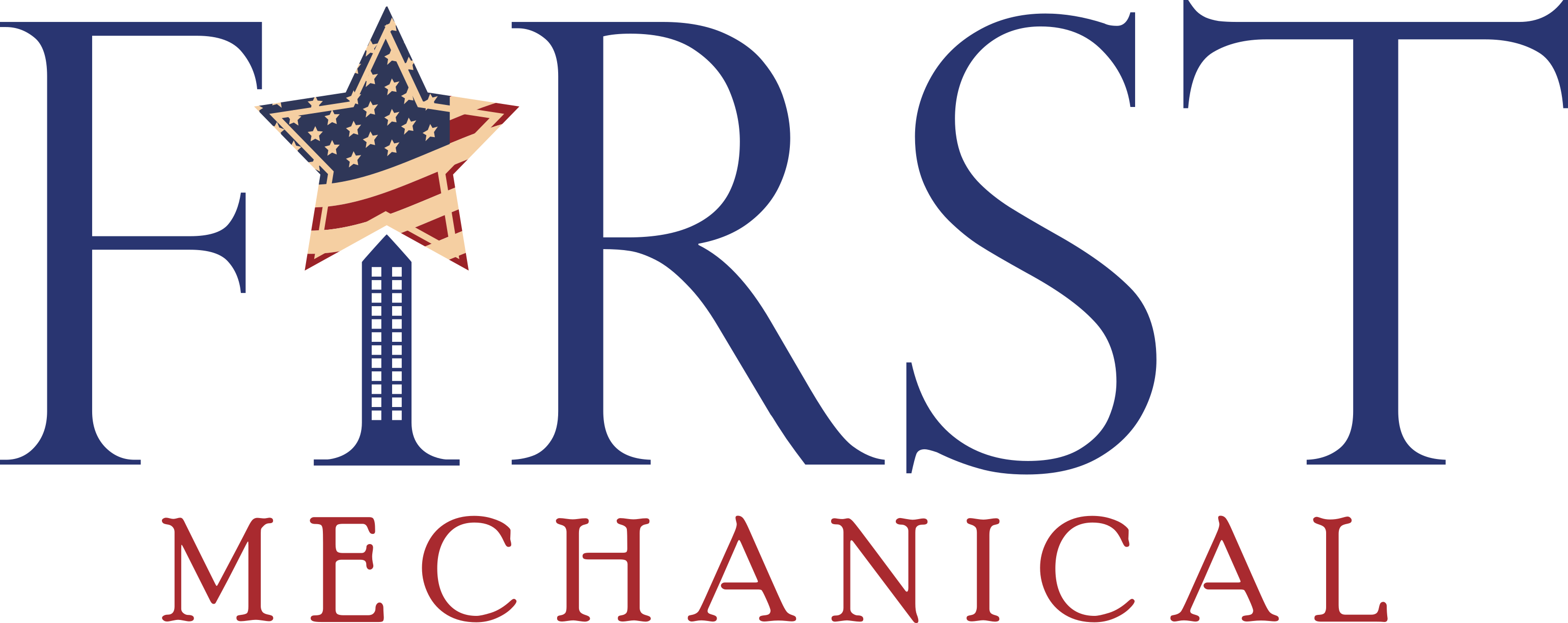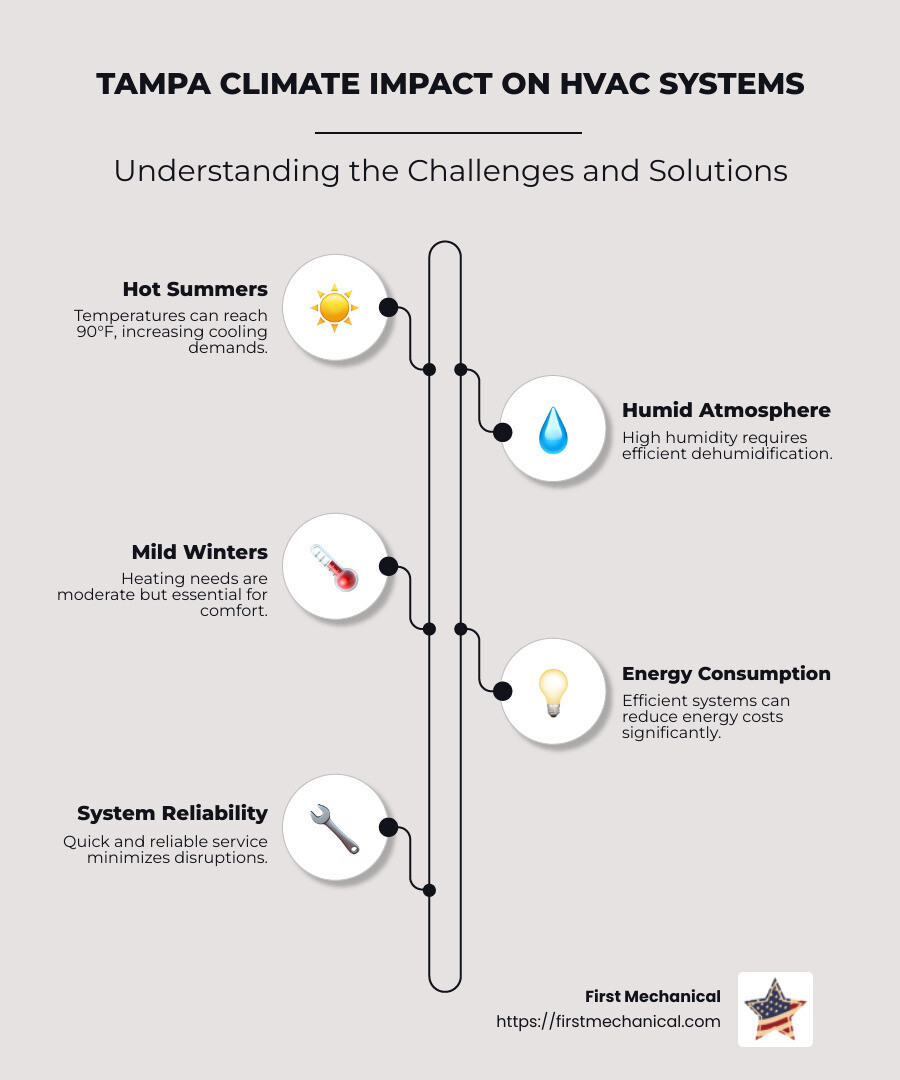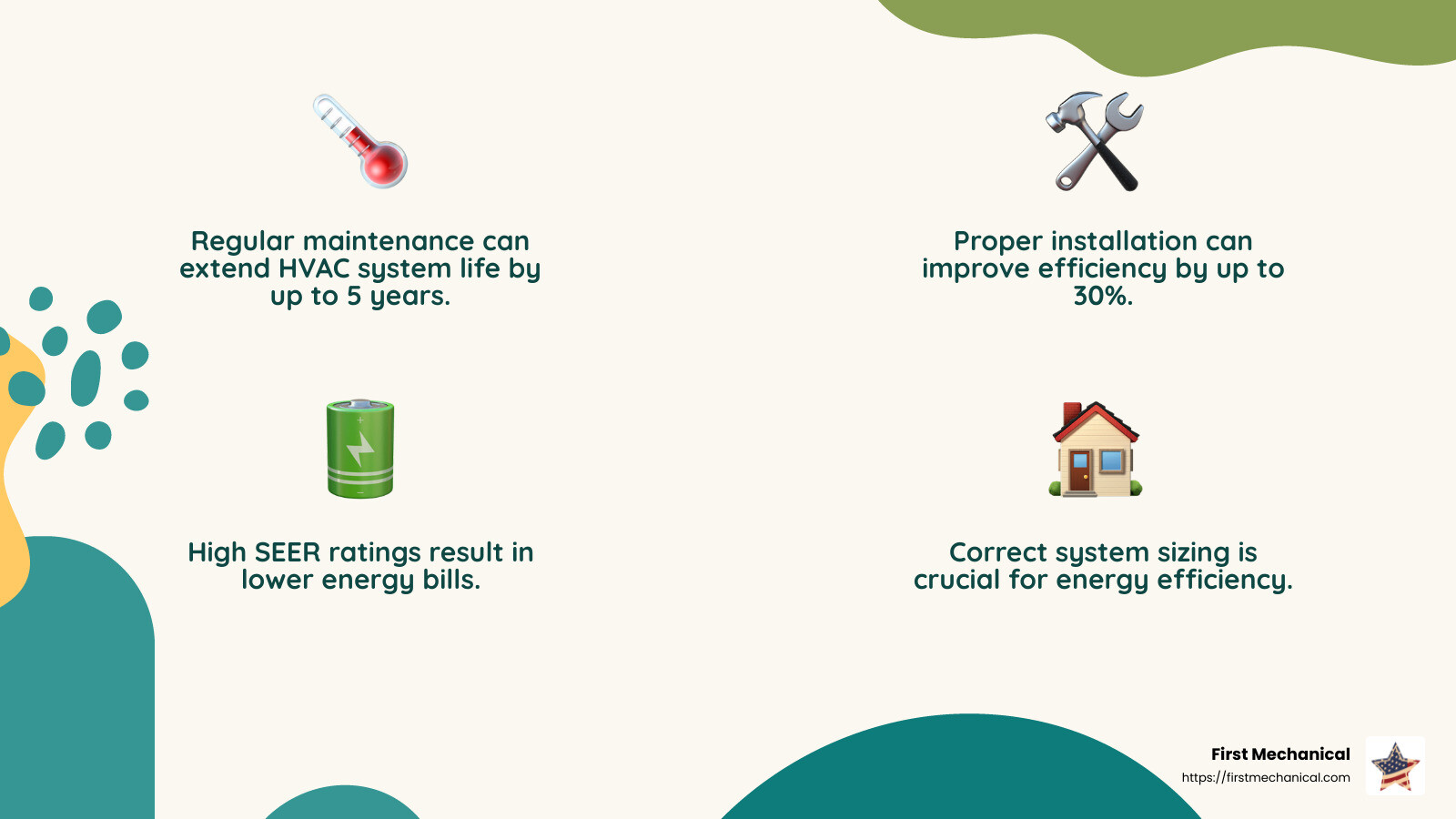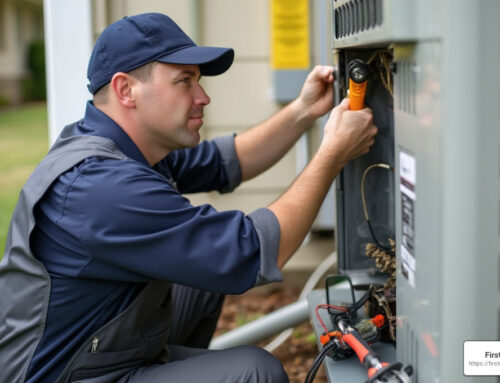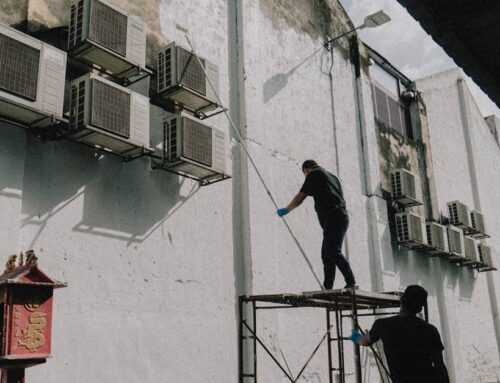
Heating and cooling Tampa is crucial due to the city’s unique climate. With humid summers that hit 90°F and mild winters, a reliable HVAC system is essential for comfort and efficiency.
- Why is HVAC important for Tampa residents?
- Ensures year-round comfort in a humid subtropical climate.
- Provides energy-efficient solutions for both residential and commercial properties.
-
Essential in managing high cooling demands during summer months.
-
Key Points for Heating and Cooling in Tampa
- Climate Adaptation: Systems must endure Tampa’s hot summers and cooler winters.
- Energy Efficiency: Reducing energy costs is vital in a city with high cooling needs.
- Reliable Service: Quick repairs minimize disruptions in both homes and businesses.
Understanding and maintaining heating and cooling systems in Tampa is more than convenience—it’s about ensuring a safe, comfortable, and productive environment throughout the year.
Understanding HVAC Systems
When it comes to heating and cooling Tampa, understanding the types of HVAC systems available is key to making the right choice for your home or business. Here’s a simple breakdown of the main types and what they offer.
Types of HVAC Systems
-
Central Air Conditioning
This is the most common type in Tampa homes. It uses a network of ducts to distribute cool air throughout the building. It’s efficient for large spaces but requires regular maintenance to keep ducts clean and free of leaks. -
Ductless Mini-Split Systems
Perfect for homes without ductwork, these systems offer flexibility. They consist of an outdoor unit and one or more indoor units, allowing for targeted cooling. They’re energy-efficient and easy to install. -
Heat Pumps
These systems are versatile, providing both heating and cooling. They are particularly efficient in Tampa’s mild winters, as they transfer heat rather than generating it. -
Hybrid Systems
Combining a heat pump with a furnace, hybrid systems automatically switch between the two for optimal energy use. This is beneficial in areas with fluctuating temperatures. -
Geothermal Systems
Though less common, these systems use the earth’s stable temperature to heat and cool homes. They’re highly efficient but come with a higher upfront cost.
System Lifespan
How long do heating and cooling systems last?
Typically, a well-maintained HVAC system can last between 12 to 15 years. Factors affecting lifespan include:
- Regular Maintenance: Routine check-ups can prevent major breakdowns.
- Usage Patterns: Systems used heavily, especially during Tampa’s hot summers, may wear out faster.
- Quality of Installation: Proper installation ensures the system functions efficiently and lasts longer.
Energy Efficiency
Energy efficiency is a top priority for Tampa residents due to the high cooling demands. Here’s how you can ensure your system is energy-efficient:
-
SEER Ratings: Look for systems with high SEER (Seasonal Energy Efficiency Ratio) ratings. Higher ratings mean better efficiency.
-
Proper Sizing: An oversized or undersized system can waste energy. A professional assessment ensures you get the right size for your space.
-
Regular Maintenance: Simple tasks like changing filters and cleaning coils can improve efficiency and reduce energy bills.
Understanding these aspects of HVAC systems can help Tampa residents make informed decisions, ensuring comfort and efficiency all year round.
Next, we’ll dive into the essential services needed to keep these systems running smoothly.
Heating and Cooling Tampa: Essential Services
Ensuring your heating and cooling systems in Tampa are running efficiently requires a mix of expert installation, timely repairs, regular maintenance, and attention to indoor air quality. Here’s what you need to know about each of these essential services.
Installation
Proper installation is the foundation of an efficient HVAC system. A poorly installed system can lead to frequent breakdowns and higher energy bills. Here are key points to consider:
-
Professional Assessment: Before installation, a professional should assess your space to determine the right size and type of system. This ensures optimal performance and energy efficiency.
-
Quality Equipment: Use high-quality components and equipment to avoid future issues. Investing in a reliable system upfront can save money in the long run.
-
Expert Technicians: Hiring skilled technicians for installation ensures that the system is set up correctly, reducing the risk of future problems.
Repair
No matter how well-maintained, HVAC systems may need repairs over time. Quick and effective repairs are crucial in Tampa’s climate:
-
Common Issues: Look out for signs like strange noises, weak airflow, or inconsistent temperatures. These can indicate underlying problems that need professional attention.
-
Timely Response: Immediate repair can prevent minor issues from becoming major headaches. Many companies offer same-day service to keep your system running smoothly.
-
Transparent Pricing: Choose a service provider that offers clear explanations and fixed pricing for repairs to avoid unexpected costs.
Maintenance
Regular maintenance is key to extending the lifespan of your HVAC system and maintaining efficiency:
-
Routine Check-Ups: Regular inspections and tune-ups can catch potential issues early. This includes checking refrigerant levels, cleaning coils, and replacing filters.
-
Maintenance Plans: Many companies offer maintenance plans that include scheduled visits and discounts on repairs. These plans can provide peace of mind and save money over time.
-
DIY Tips: Simple tasks like changing air filters every few months can improve system performance and air quality.
Indoor Air Quality
Indoor air quality is vital for health and comfort, especially in humid climates like Tampa:
-
Air Purifiers and Filters: Installing high-quality air filters and purifiers can reduce allergens and pollutants, improving overall air quality.
-
Humidity Control: Whole-house dehumidifiers can help manage Tampa’s humidity, making your home more comfortable and less prone to mold growth.
-
Regular Monitoring: Periodically checking indoor air quality ensures that your home remains a healthy environment for your family.
By focusing on these essential services, you can ensure your HVAC system in Tampa operates efficiently, providing comfort and peace of mind year-round.
Next, we’ll explore the cost considerations associated with maintaining and upgrading your HVAC systems.
Cost Considerations for HVAC Systems
When it comes to heating and cooling Tampa, understanding the costs involved is crucial. Let’s break down the average costs, factors affecting these prices, and the financing options available.
Average Costs
The cost of a new HVAC system can vary widely depending on several factors. On average, installing a central air conditioning system can cost around $5,860 nationally. However, prices in Tampa may differ due to local climate demands and installation complexities.
Breakdown of Costs:
– Equipment: The HVAC unit itself is a significant part of the cost. High-efficiency systems might have a higher upfront price but can save money over time.
– Installation: Professional installation is necessary and can vary based on the complexity of your home’s layout.
– Additional Features: Features like smart thermostats or advanced air purification systems can add to the initial investment.
Factors Affecting Price
Several factors can influence the cost of heating and cooling systems in Tampa:
- System Size: Larger homes require bigger systems, which are more expensive. A professional assessment ensures you get a system that matches your needs.
- Energy Efficiency: Systems with higher SEER ratings are more efficient but might come with a higher price tag.
- Brand and Model: Different brands offer various features and warranties, which can affect the overall cost.
- Ductwork: If your home needs new ductwork or repairs to existing ducts, this can increase costs significantly.
Financing Options
Understanding that HVAC systems are a substantial investment, many companies offer flexible financing options:
- Payment Plans: Spread the cost over time with monthly payments. This can make a new system more affordable without a large upfront payment.
- Rebates and Tax Credits: Look for energy-efficient systems that qualify for rebates or tax incentives, reducing the overall cost.
- Transparent Pricing: Some providers offer transparent pricing models with no hidden fees, ensuring you know exactly what you’re paying for.
By considering these cost factors and exploring financing options, you can make an informed decision that fits your budget while ensuring comfort and efficiency in your Tampa home.
Next, we’ll dive into energy efficiency and cost-saving tips to help you make the most of your HVAC system.
Energy Efficiency and Cost-Saving Tips
When it comes to heating and cooling Tampa, energy efficiency is key to keeping costs down. Here are some simple tips to help you save money and energy:
Thermostat Settings
Adjusting your thermostat can lead to significant savings.
- Summer: Set your thermostat to 78°F when you’re home and higher when you’re away. Every degree above 72°F can save you up to 3% on cooling costs.
- Winter: Lower your thermostat to 68°F when you’re home and even cooler when you’re sleeping or out. This can reduce heating costs by up to 10%.
Smart thermostats make it easy to adjust settings automatically based on your schedule, maximizing efficiency without sacrificing comfort.
Maintenance Plans
Regular maintenance is crucial for keeping your HVAC system running efficiently.
- Routine Checkups: Schedule annual inspections to catch small issues before they become big problems. This can extend the life of your system and improve performance.
- Filter Changes: Replace or clean filters every 1-3 months to ensure proper airflow and reduce strain on your system.
Consider signing up for a maintenance plan. These often include regular inspections, priority service, and discounts on repairs, which can save you money in the long run.
Alternative Cooling Methods
In addition to your HVAC system, try these methods to keep your home cool and comfortable:
- Ceiling Fans: Use fans to circulate air and create a wind-chill effect, making rooms feel cooler without lowering the thermostat.
- Window Treatments: Close blinds or curtains during the day to block out heat from the sun.
- Ventilation: Use natural ventilation by opening windows and doors when it’s cooler outside, typically in the early morning or evening.
By implementing these energy-saving tips, you can enjoy a more comfortable home environment while keeping your utility bills in check. Next, we’ll address some frequently asked questions about heating and cooling in Tampa to further guide you in making informed decisions.
Frequently Asked Questions about Heating and Cooling in Tampa
How much does a new central heating and cooling system cost?
The cost of a new central heating and cooling system in Tampa can vary widely. On average, installing a new central air system costs around $5,860 nationally, but this can fluctuate based on several factors. The size of your home, the type of system you choose, and any additional features like smart thermostats or advanced air purifiers can all influence the final price.
Ductwork is another crucial consideration. If your home requires new ductwork or modifications to existing ducts, this can add significantly to the total cost. It’s essential to get a detailed estimate that includes all these components to avoid surprises.
Why are HVAC techs so expensive?
HVAC technicians often seem pricey, but several factors justify their rates. First, there’s the overhead costs associated with running a service business, which includes licensing, insurance, and continuous training to keep up with the latest technology.
Travel expenses also play a role, especially in a sprawling area like Tampa. Technicians need to cover the cost of getting to and from job sites, which can add up quickly. Additionally, the specialized tools and supplies required for HVAC work are not cheap, and these costs are typically passed on to the customer.
How long do heating and cooling systems last?
The lifespan of heating and cooling systems can vary, but most systems last between 15 to 20 years with proper maintenance. Factors affecting longevity include the quality of the installation, regular maintenance, and how often the system is used.
Routine maintenance, such as annual checkups and timely repairs, can significantly extend the life of your HVAC system. Neglecting maintenance can lead to early system failures and costly replacements. By staying on top of regular service, you ensure your system runs smoothly and efficiently for as long as possible.
Understanding these aspects can help you make informed decisions about your HVAC needs in Tampa, whether you’re considering a new installation or maintaining an existing system.
Conclusion
When it comes to heating and cooling in Tampa, choosing the right service provider is crucial. At First Mechanical, we pride ourselves on delivering reliable service and customer-focused solutions custom to meet your specific needs.
Our team is dedicated to providing comprehensive HVAC services, whether you need installation, repair, or routine maintenance. We understand that each customer has unique requirements, and we aim to offer solutions that fit both your needs and budget. Our fast response times, especially in emergencies, ensure that you’re never left in discomfort for long.
We believe in empowering our customers with knowledge. By providing transparent pricing and detailed explanations of our services, we aim to build trust and ensure you feel confident in your decision to work with us. Our commitment to customer satisfaction is reflected in our attention to detail and the high standards we maintain in every job we undertake.
For more information on how First Mechanical can assist with your HVAC needs, visit our Tampa Commercial AC Repair page. Our expert team is ready to help you achieve optimal comfort in your home or business, ensuring that your heating and cooling systems are always running at their best.
